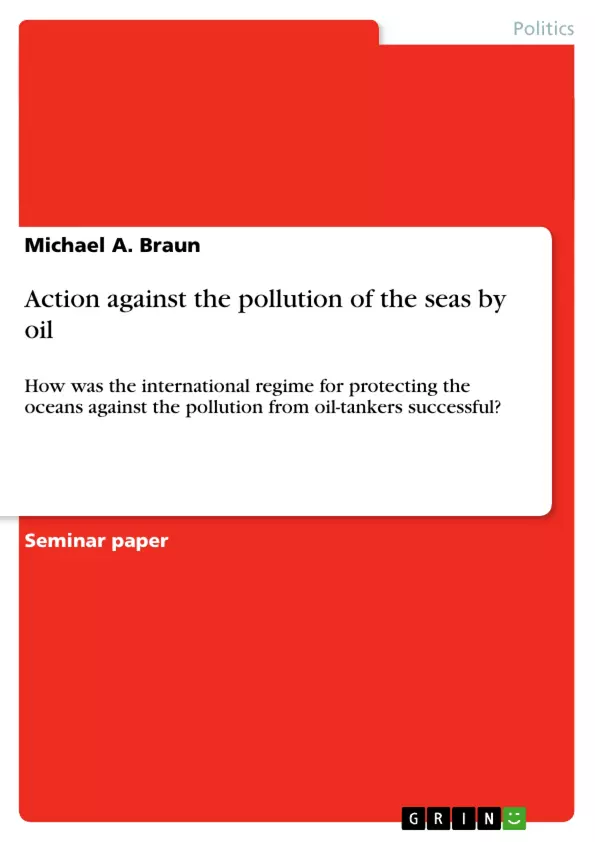For a long time oceans were seen as vast and restless. In recent years, however, this view has changed since the pollution of the sea became an ever serious problem. Fairly cleaned liquids as well as various waste-pieces have massive implications on the maritime life. In addition, intentionally discharged as well as accidentally released oil-products propose a huge challenge to the global community.
Therefore the essay elaborates on this ecological issue with focus on oil-tankers as well as it lists up international actions taken against it. These are regime-induced (MARPOL 73/78) modifications at the ships itself such as load on top, segregated and protectively located ballast tanks, crude-oil-washing and double-hulls.
The hypothesis of the paper is that the international measures taken have been adequate in general and changed the discharging habits of the industry lastingly. The agreements also seem to have made it possible to have the oceans nowadays less polluted than it assumably would have been without them. Therefore, apart from minor potential future corrections, the international regime for protecting the oceans against the pollution from oil-tankers was rather successful.
Inhaltsverzeichnis (Table of Contents)
- Abstract.
- List of references.
- Handout for the presentation in the seminar
- 1 Introduction and academic method.
- 2 A deadly collection of ecological issues for the high seas
- 2.1 Accidents and unintended actions..
- 2.2 Intended oil-discharging on sea.........
- 3 International Maritime Organisation, or the arise of a regime........
- 3.1 Pre-MARPOL 73/78 agreements
- 3.2 The MARPOL 73/78 agreement and its amendments
- 4 Regime-induced modifications and procedures at oil-tankers
- 4.1 Load-on-top technique
- 4.2 Segregation and protective location of ballast tanks.
- 4.3 Crude-oil-washing.....
- 4.4 Single-hull turned into double-hull tankers………….
- 4.5 Assessment of the actions taken - and ideas beyond.
- 5 Conclusion........
Zielsetzung und Themenschwerpunkte (Objectives and Key Themes)
This paper explores the ecological issue of oil pollution from tankers in the oceans and analyzes the effectiveness of international measures implemented to address this challenge. The central goal is to assess the success of the international regime for protecting the oceans against oil pollution, particularly those measures introduced by the MARPOL 73/78 agreement. Key themes explored in this work include:- The impact of oil pollution from tankers on marine life and ecosystems
- The evolution of international regulations and agreements aimed at preventing oil pollution
- The effectiveness of regime-induced modifications on tankers, such as load-on-top techniques, segregated ballast tanks, crude-oil-washing, and double-hulls
- The overall success of the international regime in mitigating oil pollution from tankers
Zusammenfassung der Kapitel (Chapter Summaries)
This section provides summaries of the chapters, excluding the conclusion.- Chapter 1 - Introduction and academic method: This chapter establishes the context of the research, outlining the historical perspective of ocean pollution and its increasing prominence. It further presents the academic methodology employed in the study.
- Chapter 2 - A deadly collection of ecological issues for the high seas: This chapter dives into the specific ecological challenges posed by oil pollution, focusing on the consequences of accidents and unintended oil releases, as well as intentional discharges into the oceans.
- Chapter 3 - International Maritime Organisation, or the arise of a regime: This chapter examines the establishment and development of the international regime aimed at preventing oil pollution, with particular emphasis on the pre-MARPOL 73/78 agreements and the subsequent implementation of the MARPOL 73/78 convention and its amendments.
- Chapter 4 - Regime-induced modifications and procedures at oil-tankers: This chapter delves into the specifics of modifications imposed on oil tankers by the international regime. It explores techniques like load-on-top, segregated ballast tanks, crude-oil-washing, and the transition from single-hull to double-hull tankers. It also assesses the effectiveness of these measures and examines potential future improvements.
Schlüsselwörter (Keywords)
The keywords encompassing the primary focus of this paper include: oil pollution, marine environment, tanker safety, MARPOL 73/78, international regime, load-on-top, segregated ballast tanks, crude-oil-washing, double-hulls, environmental protection, maritime law, and sustainability.Frequently Asked Questions
What is the MARPOL 73/78 agreement?
MARPOL 73/78 is the main international convention aimed at preventing pollution of the marine environment by ships from operational or accidental causes, specifically targeting oil, chemicals, and harmful substances.
How do double-hulls protect the oceans?
Double-hulls provide an extra layer of protection between the oil tanks and the ocean. In the event of a low-impact collision or grounding, the outer hull may be breached while the inner hull remains intact, preventing oil spills.
What is "crude-oil-washing" (COW)?
Crude-oil-washing is a process where the oil tanks on a tanker are cleaned using the crude oil itself during discharge. This method is more effective than water washing and reduces the amount of oil left in the tanks and subsequent pollution.
What is the "load-on-top" technique?
Load-on-top is a procedure used to minimize oil discharge during ballast water changes. It allows oil to separate from water in a slop tank, after which the clean water is discharged and new cargo is loaded on top of the remaining oil residue.
Has international action against oil pollution been successful?
The thesis argues that international measures have been generally adequate and have successfully changed industry habits, resulting in significantly less pollution than would have occurred without these regulations.
- Quote paper
- Michael A. Braun (Author), 2006, Action against the pollution of the seas by oil, Munich, GRIN Verlag, https://www.grin.com/document/116896



